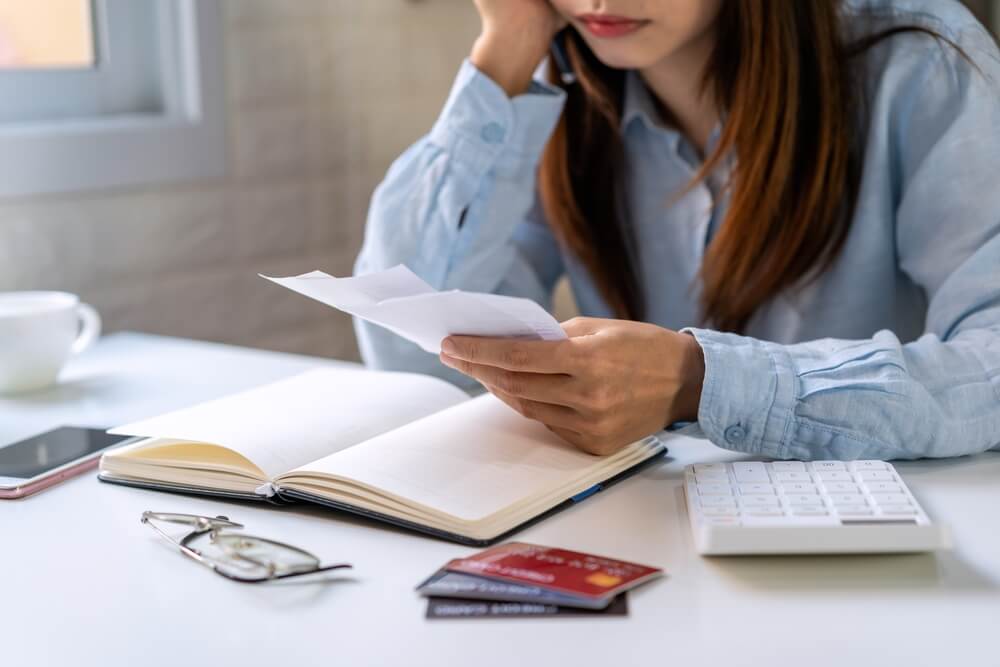If you’ve received a notice of default for missed payments, it’s important to understand what this means and how it can affect your credit score.
In this guide, we’ll explain what a default notice is, how missed payments could affect your credit profile, and what happens if you get a default notice.
What is a default notice?
Default notices are applied by creditors when payments for a loan or other account have been missed.
Default notices come as a warning from creditors that you owe money, and will spell out the consequences of continuing to miss payments, including damaging your credit score.
Default notices can quickly become a big problem, so it’s important to take the notice seriously when you first receive it; look into available options and talk with a qualified debt professional about what steps you may need to take in order to remedy the default.

Why choose YourDebtExpert?
- Write off unsecured debts over £5,000
- Stop interest and charges soaring
- Reduced payments from £85 per month
Why would I receive a default notice?
Missed payments on a credit agreement
Missed payments on a credit agreement, such as credit card bills, utilities, and phone contracts all can lead to a default notice.
Default notices are issued by the creditor or lender as a reminder to pay overdue debts, and as the first in a long list of debt collection options available to the creditor.
If ongoing payments are continually missed, and you fail to agree to an acceptable repayment plan, then the creditor may decide to initiate more serious, and financially damaging, debt collection proceedings.
Will a default notice affect your credit rating?
Yes, a default notice will affect your credit rating, as it is recorded by credit reference agencies and listed on your credit report.
This sends a signal to lenders that you have a history of failing to repay credit agreements on time, which in turn will cause damage to your credit rating, making it more difficult for you to access loans and mortgages in the future.
If you have received a default notice due to an unpaid debt, then it is important to take action to address the issue as soon as possible in order to limit the damage to your credit profile.
How long do default notices stay on your credit file?
Receiving a notice of default over missed payments isn’t something to shrug off easily – it has serious consequences, one of which is leaving a black mark on your credit file.
This black mark will remain on your file for six years from the date you defaulted on the account, which can make it much harder to be accepted for credit cards and other types of credit agreements.
The good news is that the default can still be removed by a credit reference agency after six years have passed, even if you haven’t repaid the debt in full by then.
This should mean your credit rating will gradually start to improve.
What happens when you receive a notice of default?
A notice of default usually takes the form of a formal letter from a creditor that states you have failed to make the minimum payments for your debt on time.
When you receive a default letter, the creditor will usually ask you to repay the debt in full, either at once or through a gradual repayment plan.
If you are unable to pay the full amount back upfront, you may be able to come up with an alternative payment plan allowing you to pay in instalments over an extended period of time.
Coming up with some form of payment plan is the only way to avert severe damage to your credit score and limits on your ability to access credit in the future.
Debt Calculator
What happens if I continue missing payments?
When you first receive a default notice, your creditor will ask you to settle the missing payments.
If you fail to do so and they want to pursue further action, their are various enforcement options available to them.
Pass the debt to a debt collection agency
Your creditor may choose to pass the debt to a debt collection agency. Debt collectors will attempt to collect on what is owed by putting pressure on you through phone calls, emails, or even visits to your home.
Apply to the court to seize certain goods
In cases where the debt was the result of missed payments to a hire purchase agreement, your creditor might apply to the courts for permission to seize the goods from you in order to settle the full amount of debt, which could mean losing key items like your car or furniture.
Take legal action against you
Finally, in cases of severe and ongoing non-payment, your creditor may decide to pursue further legal action that could result in property repossession, or even a bankruptcy petition being taken against you.
Can I face legal action over a default notice I’ve received?
Yes, you can face legal proceedings over a default notice you have received, but it depends on whether your debt is protected under the Consumer Credit Act 1974.
If your debt is protected under the Consumer Credit Act
If your debt is protected under the Consumer Credit Act, your creditors won’t be able to take any further legal action against you unless your account has defaulted.
If you default on your account
If you default on your account, you may face legal action from creditors.
On top of the long-lasting damage to your credit score that comes with a default notice, further legal action from your creditors can include anything from county court bailiff visits to confiscation of goods, or even being made forcibly bankrupt through a bankruptcy petition to the courts.
Where can I get debt advice if I’m struggling with missed payments?
If you’re struggling to make payments and worried about receiving a default notice letter, we can help.
At Your Debt Expert, we specialise in offering free debt help and access to formal debt solutions that work for you.
To find out more about how we can help you move past your debt, please contact one of our friendly debt advisors today.
Where can I get more advice on Notice of default: What to do if you receive a default notice and other debt solutions?
To discuss your options and get the support you need to deal with your debt today, contact us now on 0800 082 8086 or click the button below to get started.





